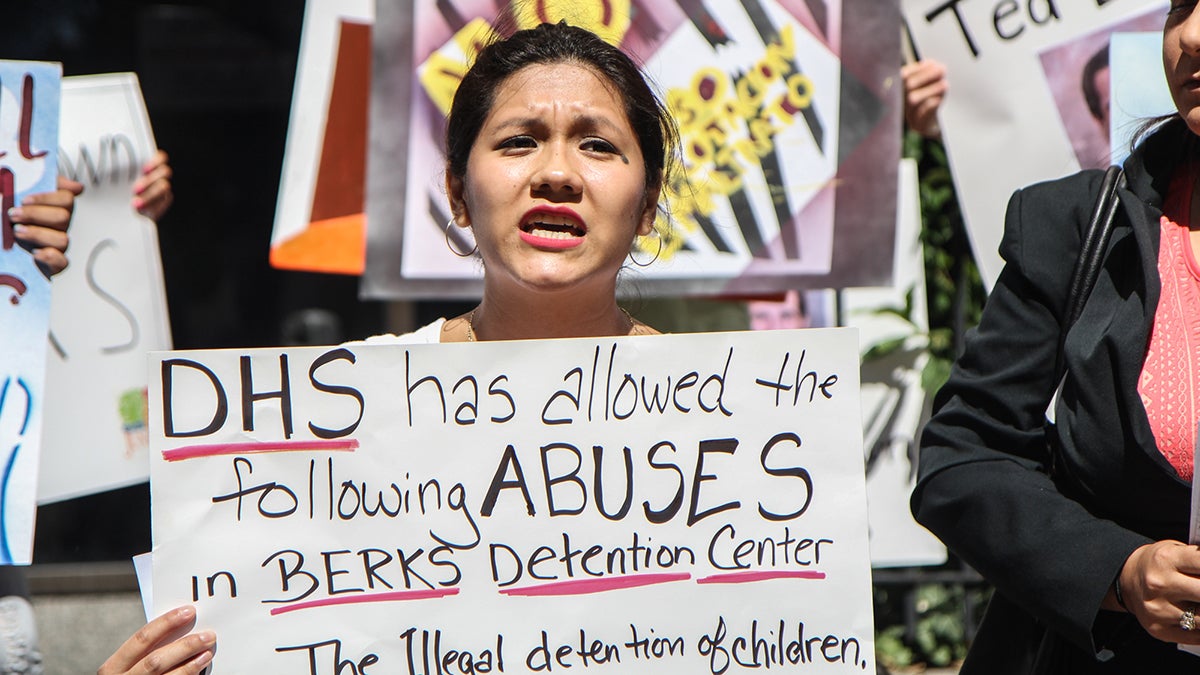Pa. immigrant detention center strikers pause for a week, citing threats

Olivia Vazquez is a youth leader with Juntos. (Kimberly Paynter/WHYY)
UPDATED
More than a dozen women who crossed into the U.S. illegally with their children continue to protest their long detention in a Pennsylvania facility.
A hunger strike that started Aug. 8 has paused for a weeklong “fast” of one meal a day, before the women resume the strike next week.
“We have been pushed to suspend the hunger strike by the threat of immigration officials, who have told us that, if our health weakens, the government will take away our children and send us to adult prisons,” said the mothers in an emailed statement.
Twenty-two women, whose stays at the Berks Family Residential Center have ranged from 60 days to more than a year, initially announced they would forgo food until they are released. During the next two weeks, two of the protesters were released to stay with family in the U.S. while their cases wind through immigration courts, according to immigrant advocate Adanjesus Marin, with Make the Road Pennsylvania. U.S. Immigration and Customs Enforcement officials have not yet verified those releases.
The Berks Family Residential Center is one of three secure facilities in the country used to detain children and their mothers in the midst of immigration proceedings. All three face huge pressure to close from immigration rights groups, who say detainees should stay with family members in the US while their cases proceed.
Last summer, a federal judge in California ruled that ICE must end its practice of detaining single mothers and their children who cross the U.S. border illegally, although the ruling allows for a grace period of up to 20 days in detention.
The protesting mothers have applied for asylum in the U.S., citing gender or gang violence in Central America, and their cases are ongoing.
Some of the hunger strikers, along with the ACLU, have sued ICE, arguing that their initial interviews with border patrol officers about their asylum cases were incomplete and that they should have the right to appear before an immigration judge.
Those plaintiffs feel they are being held longer than necessary, in retaliation for the case.
“The officials say they cannot do anything for those of us who are part of the federal case, they discriminate against us because we had the courage to ask for help from the federal courts to fight for our cases,” they said in the statement.
ICE denies any retaliatory intent and released only this statement on the record:
“The safety, well-being and housing conditions of those in U.S. Immigration and Customs Enforcement (ICE) care are of utmost importance to the agency. The agency remains committed to ensuring that all individuals in our care are housed humanely and that they have access to legal counsel, visitation, recreation, and quality medical and mental health care.”
Court documents filed by attorneys for ICE in the ACLU case argue that the longer than average detention times are “a discrete instance where a group of aliens whose removal should already have been executed have been successful in postponing their removal.”
Dr. Allen Keller, a medical professor at New York University, has been regularly visiting the facility at the behest of lawyers representing some of the detainees.
During the hunger strike, “the common complaints I was hearing were weakness, fatigue, burning in the stomach and heartburn,” he said. “All the women were alert and oriented.”
Keller studies health during detention — in particular mental health — and said ongoing imprisonment with no end in sight can cause long-term health effects.
“Their health states are clearly worsening while they’re in detention, in particular their emotional. Levels of depression and anxiety appear to be increasing,” he said. Some of the children also show signs of regression, he said, such as wetting the bed.
In response to the hunger strike, US Senator Bob Casey wrote a letter to Department of Homeland Security Secretary Jeh Johnson.
“The women and children currently in detention, in many instances have come here from some of the most violent nations on Earth, often escaping rape, murder, and domestic assault. These families deserve a fair opportunity to seek asylum. They do not deserve to be treated as criminals,” he wrote, urging Johnson to end family detention at Berks.
Activist groups are planning a protest outside the Berks facility this Saturday at noon.
WHYY is your source for fact-based, in-depth journalism and information. As a nonprofit organization, we rely on financial support from readers like you. Please give today.

